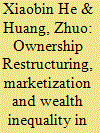| Srl | Item |
| 1 |
ID:
192323


|
|
|
|
|
| Summary/Abstract |
This paper examines how the adoption of FinTech affects household consumption in the presence of economic uncertainty. We use regional-level FinTech adoption and economic uncertainty measurement, along with representative household-level consumption data, to investigate this issue. Our empirical analysis shows that while high levels of economic uncertainty lead to a shift in household consumption from services to non-durable goods, widespread adoption of FinTech overcomes this negative effect and prevents the reduction in service spending. We use the distance of a household from Hangzhou and the economic uncertainty in the United States as proxies for exogenous variation in FinTech adoption and economic uncertainty in China, respectively, and find similar results. Focusing on the transmission channel, we find that FinTech helps alleviate credit constraints, contributes to entrepreneurship and employment opportunities, and thus mitigates the negative impact of economic uncertainty on household consumption.
|
|
|
|
|
|
|
|
|
|
|
|
|
|
|
|
| 2 |
ID:
114791


|
|
|
|
|
| Publication |
2012.
|
| Summary/Abstract |
This paper proposes a property transformation perspective to examine the mechanisms of wealth accumulation and wealth inequality creation during China's post-1978 transformation. It examines how enterprise ownership restructuring, marketization and state politics have resulted in greater wealth inequality between cadres and ordinary workers, between public sectors/organizations and private sectors/organizations. Mainly drawing on data from the Chinese Household Income Project conducted in 1995 and 2002, we find that the property transformation process has created greater wealth disparity among different occupational groups and among those working in different work organizations since the mid-1990s. However, it is inconclusive whether non-housing wealth or total household wealth are increasing at the same pace across different occupations and work organizations with the growing market penetration and the spread of privatization.
|
|
|
|
|
|
|
|
|
|
|
|
|
|
|
|